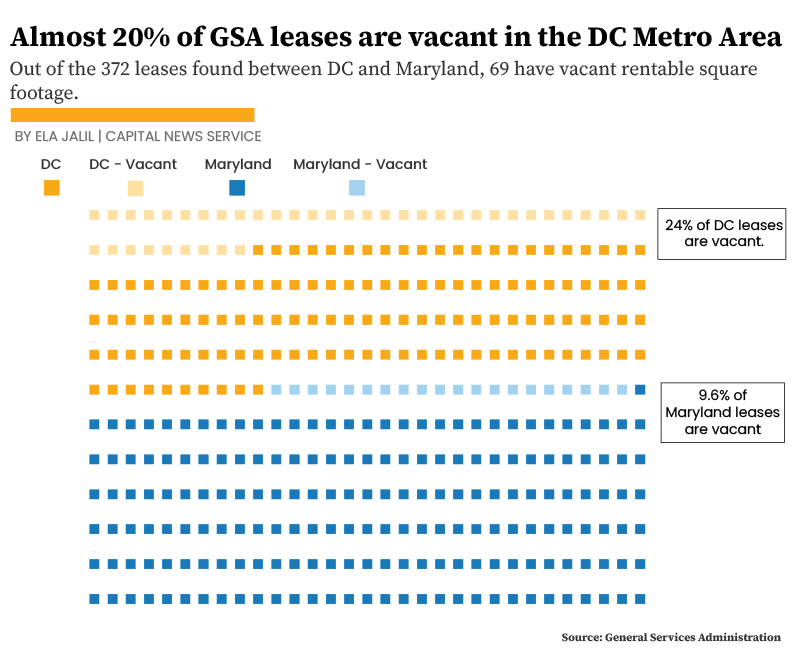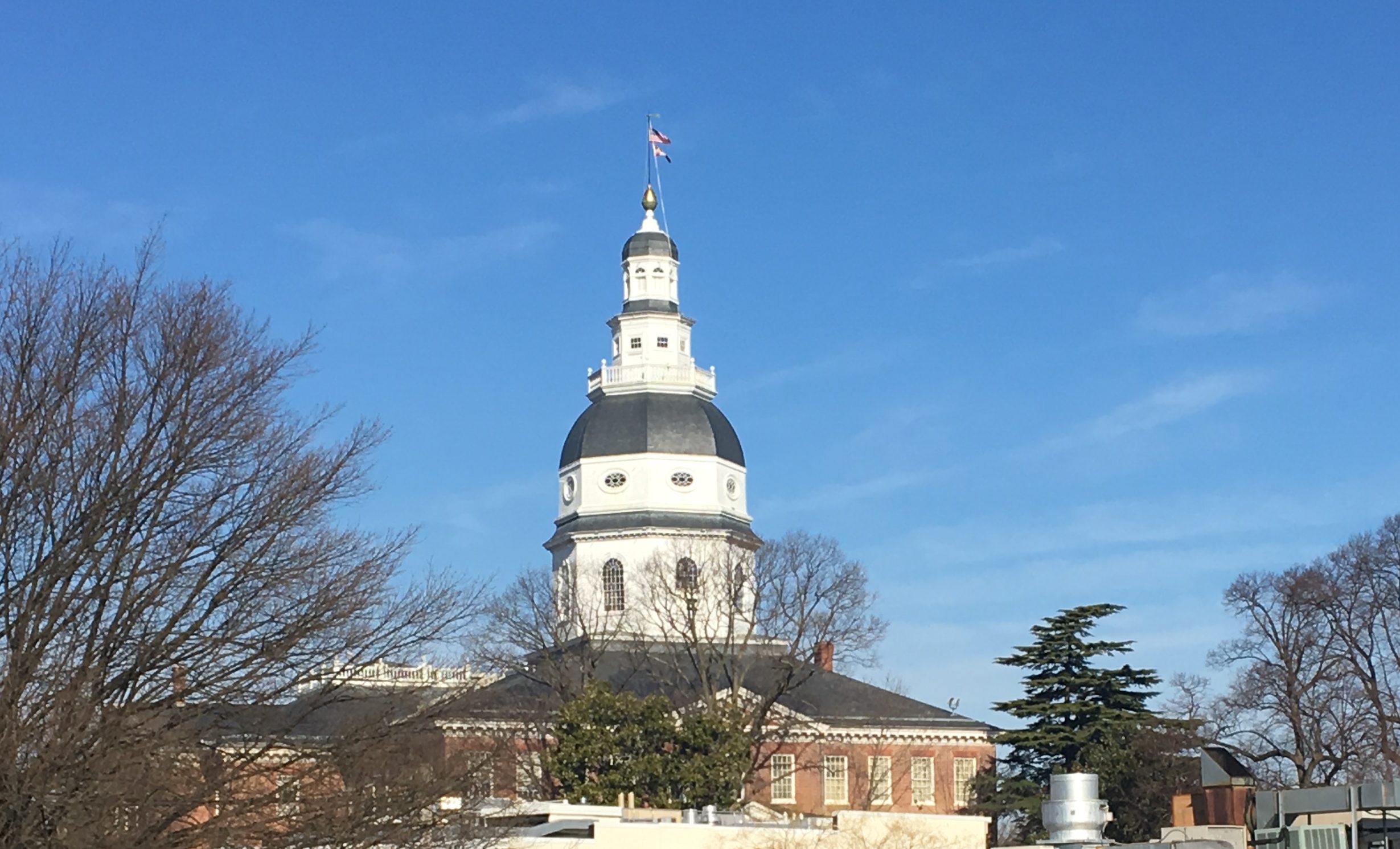DOGE is cutting GSA leases across Maryland and D.C. Here’s why the market’s optimistic
By ADAM HUDACEK, ELA JALIL
The Department of Government Efficiency’s (DOGE) mission to dramatically reduce the General Service Administration’s (GSA) federal portfolio has sparked cautious optimism in the Capital region’s real estate market, despite swift backlash from Maryland’s congressional leadership.
DOGE claims to have terminated 679 GSA leases across the country, totaling nearly 8 million square feet of federal office space that the department says will save taxpayers an estimated $400 million, according to its website. Nearly 30 leases worth about $7.5 million in claimed savings have been terminated across Maryland and Washington, D.C., although the agency has withheld the terminated leases’ exact addresses.
Since its establishment in January, the newly appointed, Elon Musk-led federal body has entangled itself with the GSA, establishing dormitory spaces within the administration’s F Street headquarters, Politico reported in early March. DOGE boasts the GSA as one of its top areas of savings, with the GSA’s acting administrator, Stephen Ehikian, promising a strong collaboration between the two organizations.
While the terminations only represent a fraction of the GSA’s 363 million square foot portfolio, further cuts are expected in the coming months. The Trump administration’s efforts to curb government leases come as thousands of federal workers are returning to the office. President Donald Trump signed an executive order ending remote work across the federal government on his first day in office.
Maryland and D.C. are home to hundreds of federal leases, primarily concentrated around the District and its surrounding suburban counties. The federal government holds 165 leases within the nation’s capital, mostly clustered around the National Mall. Maryland tallies 207 leases, stretching from the mountain towns of the state’s panhandle to the coasts of the Eastern Shore.
Of the region’s 372 leases, about 36% are set to expire by the end of 2027, according to recent GSA data. Thirteen leases have already hit their expiration dates and it’s unclear if these leases have been included as a part of DOGE’s claimed $400 million lease termination savings.
In January, DOGE announced a preliminary focus on vacant GSA leases, which make up almost a fifth of all federal leases in Maryland and D.C. Nearly all of these vacant leases in Maryland can be found within the Washington metro region.
When reached for a comment, a GSA spokesperson stated that the “GSA is reviewing all options to optimize our footprint and building utilization,” while still “supporting the return to office of federal employees, and taking advantage of a stronger private/government partnership in managing the workforce of the future.”
While the veracity of DOGE’s terminations have shocked Washington, the effort is nothing new. According to data from Chicago-based real estate firm Cushman & Wakefield, the footprint of federal leases in the Washington metro region has dropped 24% since 2012.
 The former GSA administrator under President Joe Biden, Robin Carnahan, was similarly focused on reducing the federal footprint, stating a desire for “fewer buildings, better buildings” in an editorial penned for The Hill in April, 2024.
The former GSA administrator under President Joe Biden, Robin Carnahan, was similarly focused on reducing the federal footprint, stating a desire for “fewer buildings, better buildings” in an editorial penned for The Hill in April, 2024.
Since 2016 there has been a decrease in GSA leases in the D.C. region by about 3% per year until COVID started in 2020 which pushed the trend to about 4% per year, or about 1.5 million square feet, according to Henry Murphy, a market intelligence analyst at the Toronto-based global real estate advisory firm Avison Young.
The GSA is already slated to terminate 1.7 million square feet of leases within northern Virginia, Washington and suburban Maryland, Murphy said. Avison Young analysts in New York have begun to see the positive effects of repurposed former government buildings on the city’s real estate market, creating optimism for the future of the District’s shaky commercial real estate marketplace.
“It’s only a good thing from our opinion at this point,” a spokesman for Avison Young said.
A former GSA lease owner has the ability to renovate its office space to become a more competitive property within the market or convert it into a residential space, Murphy said. There will also likely be a decrease in price in the market, which allows different industries like media companies or law firms to obtain office space at a lower price.
All leases currently being terminated by the GSA have either hit soft termination dates or were in renewal holdover after hitting lease expiration dates. A soft termination allows the federal government to leave a lease before it is scheduled to end without penalty. Around 6 million square feet of D.C. region federal property will hit its soft termination point by the end of 2025, Murphy said. Earlier this month, Politico reported that about 3,000 of the GSA’s roughly 7,500 leases are in their soft termination phase nationwide.
The federal government can also attempt to back out of a lease by claiming a landlord failed to meet lease obligations, including property maintenance, according to international law firm Arnold and Porter. Any other action from the government to terminate its lease before the end date would award the lease owner damages for breach of contract.
The state’s congressional Democrats painted a darker picture of the GSA terminations’ impacts on Maryland’s federal footprint than the commercial real estate analysts. Reps. Jamie Raskin, Glenn Ivey, and Johnny Olszewski, have called for greater accountability for what Olszewksi called “DOGE’s reckless attacks on our civil service.”
About half of Maryland’s GSA leases fall within the Ivey and Raskin’s congressional districts.
“Just like Trump and Musk are ripping off federal workers and selling out American values, now they’re selling off federal buildings and properties. This is one more corrupt Trump-Musk deal that will hurt the country and enrich MAGA donors and cronies,” Raskin said in a statement to Capital News Service. “A number of properties in Maryland’s Eighth District could be at risk because of this lawlessness. It is Congress which controls federal appropriations and spending priorities—not Elon Musk.”
Despite Raskin’s strong condemnation of DOGE’s actions, the representative’s office hasn’t received much outreach from constituents on the issue of GSA leases, according to a Raskin aide.
CNS Washington reporter Daranee Balachandar contributed to this story.

Capital News Service is a student-powered news organization run by the University of Maryland Philip Merrill College of Journalism. With bureaus in Annapolis and Washington run by professional journalists with decades of experience, they deliver news in multiple formats via partner news organizations and a destination Website.

